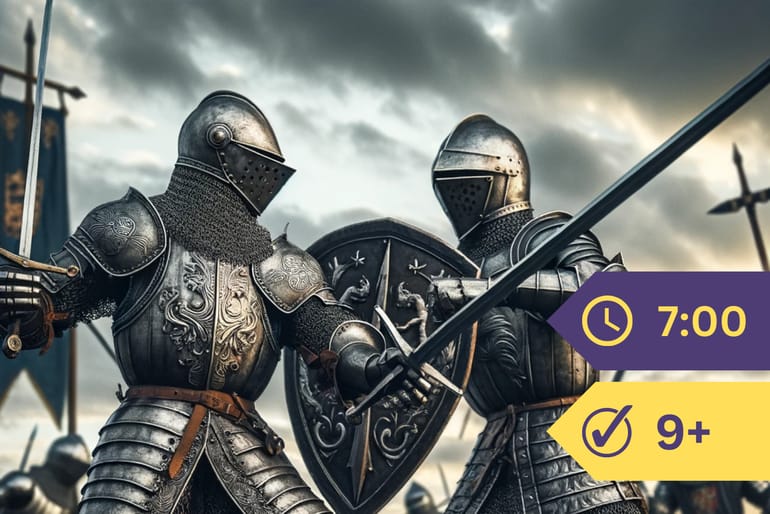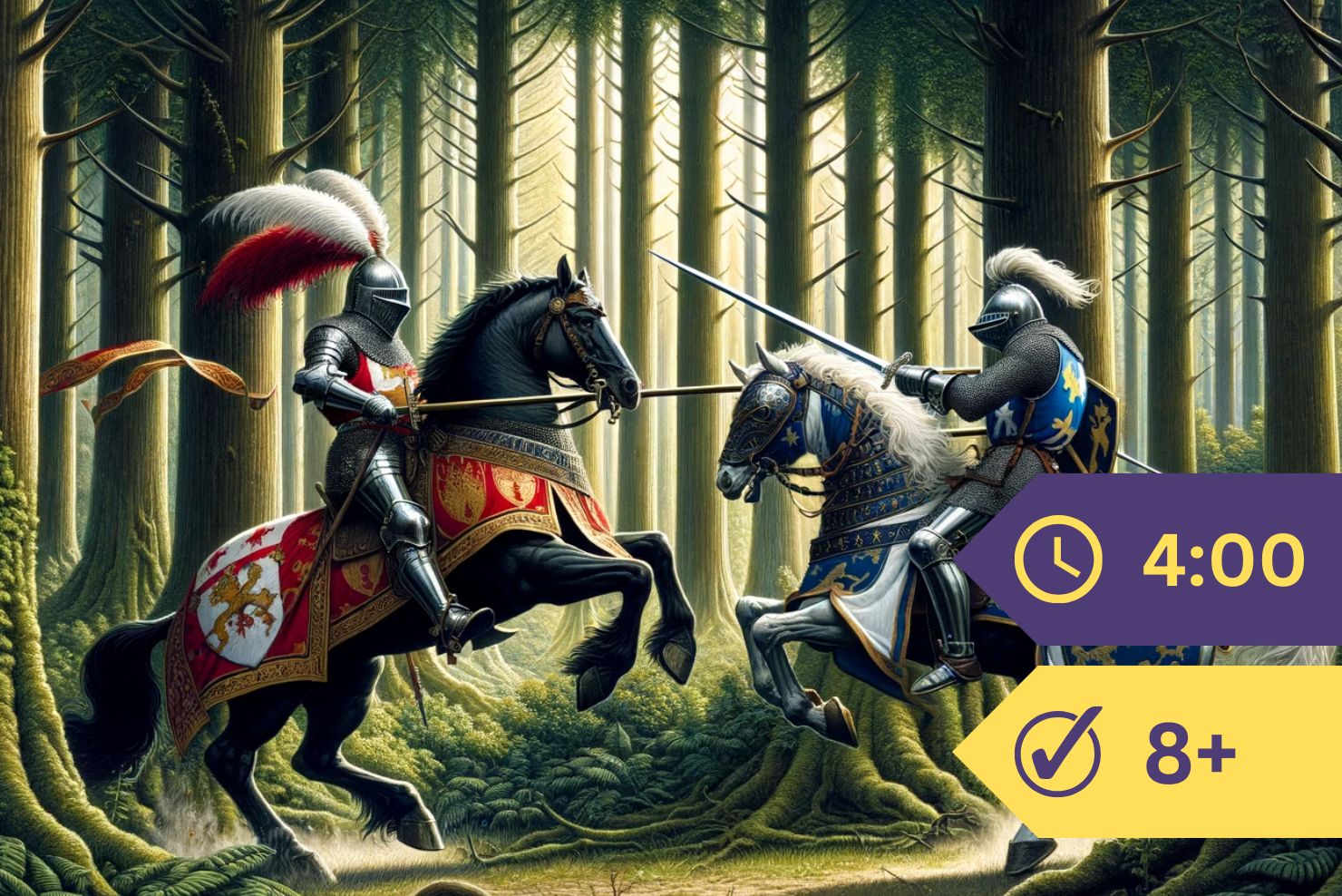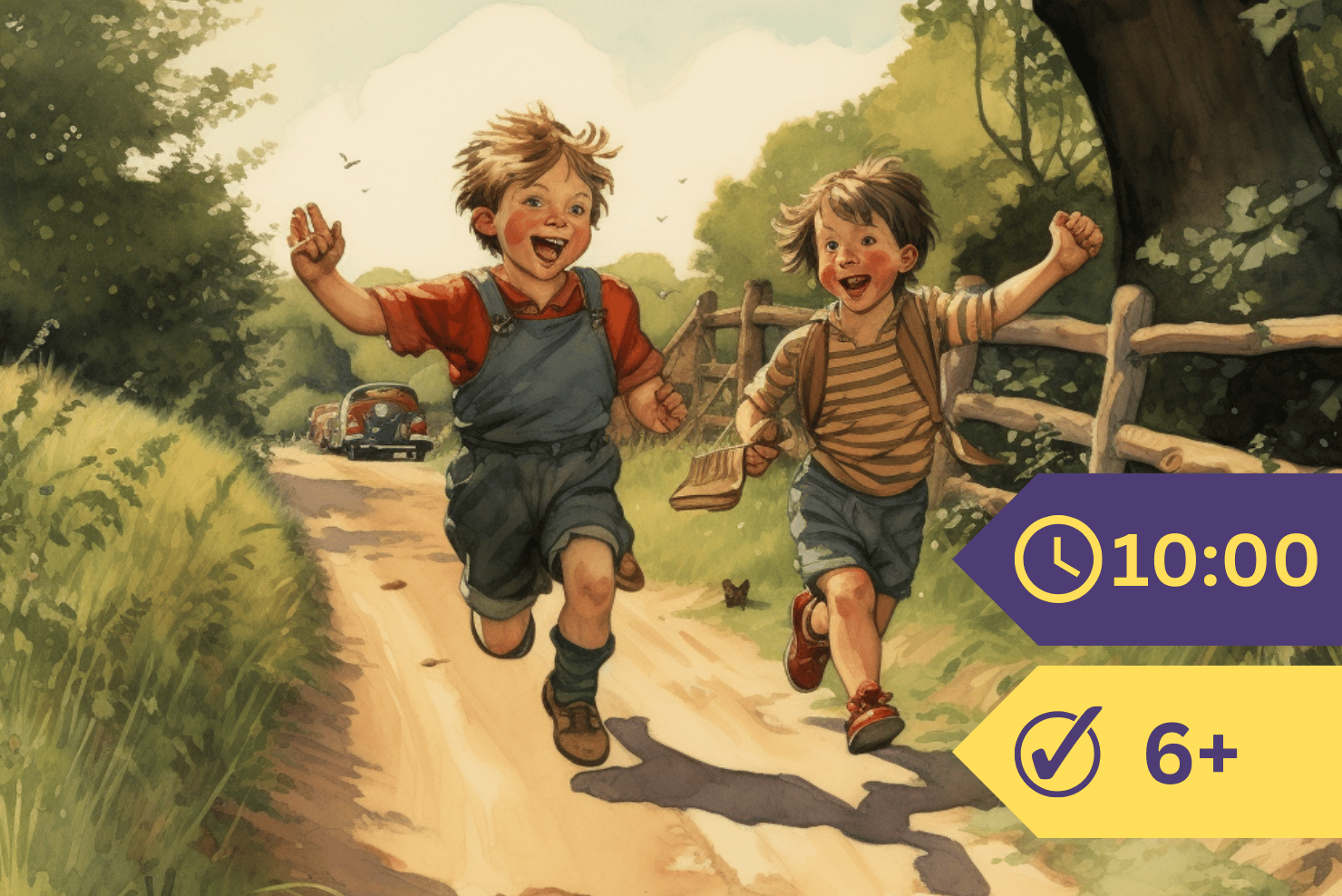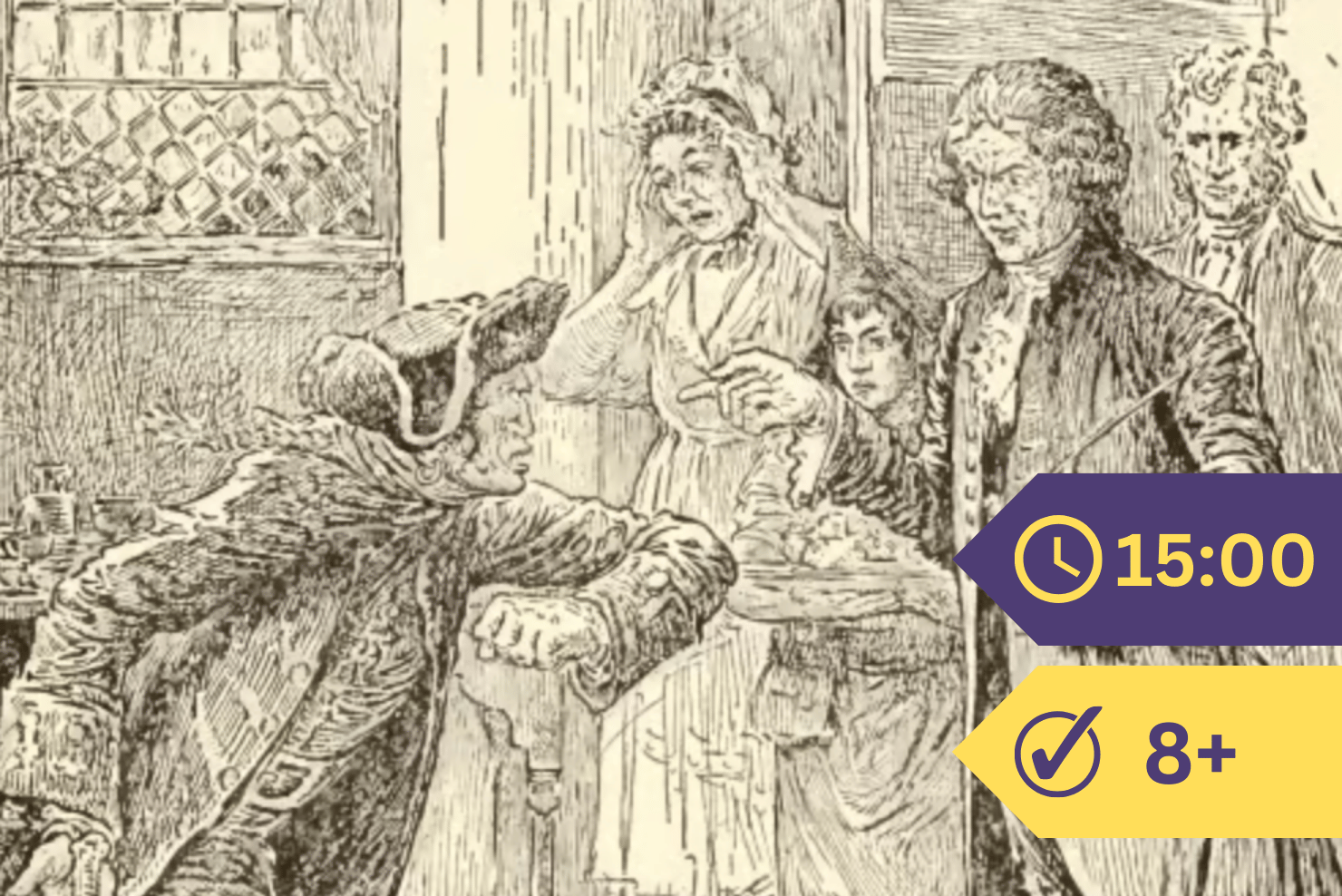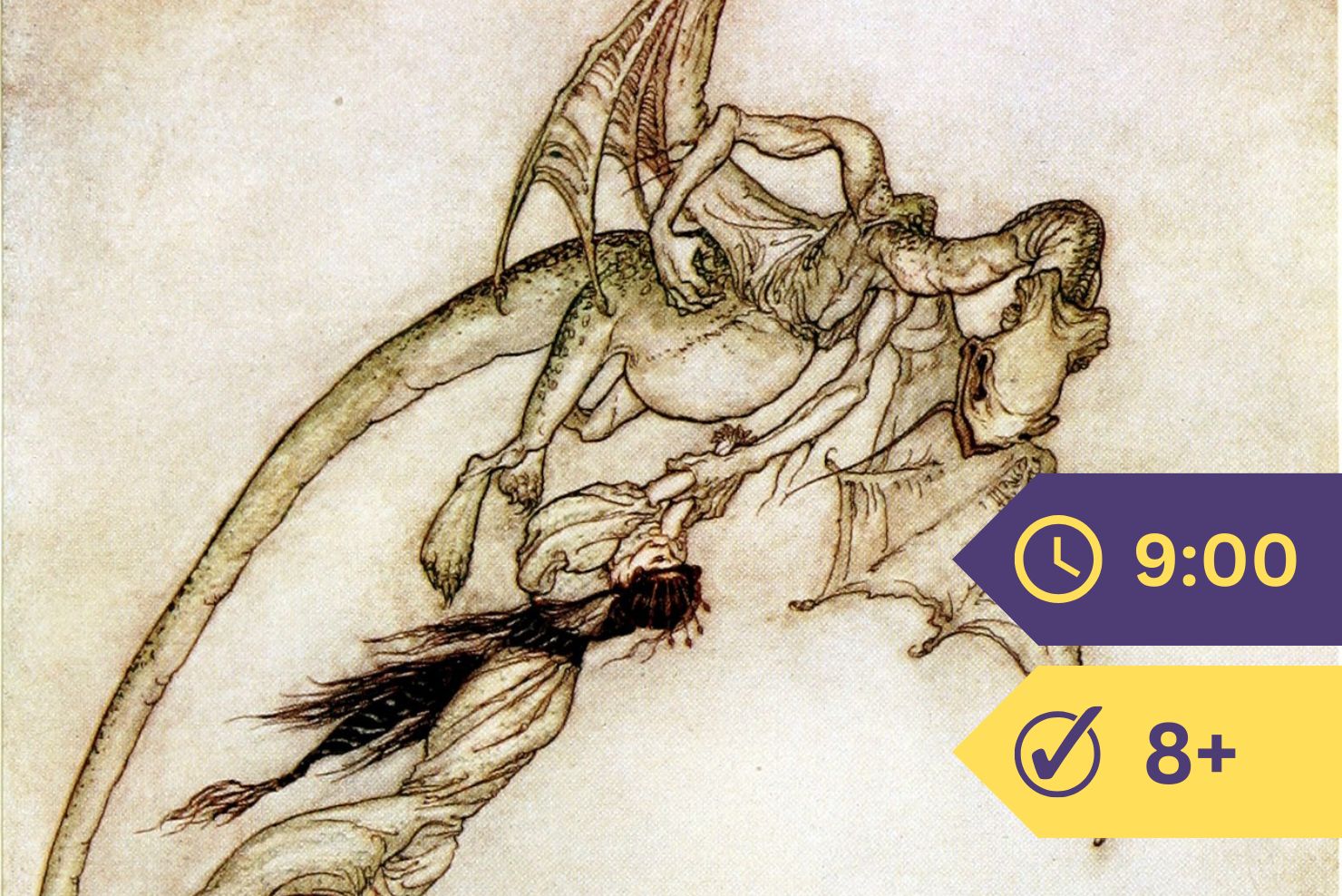Among the knights vowed to the Quest of the Holy Grail was Sir Bors, one of the kin of Sir Launcelot, a brave knight and pious. He rode through the forest many a day, making his lodging most often under a leafy tree, though once on his journey he stayed at a castle, that he might do battle for its lady against a felon knight who would have robbed and oppressed her.
So, on a day, as he rode through the forest, Sir Bors came to the parting of two ways. While he was considering which he should follow, he espied two knights driving before them a horse on which was stretched, bound and naked, none other than Sir Bors’ own brother, Sir Lionel; and, from time to time, the two false knights beat him with thorns so that his body was all smeared with blood, but, so great was his heart, Sir Lionel uttered never a word. Then, in great wrath, Sir Bors laid his lance in rest and would have fought the felon knights to rescue his brother, but that, even as he spurred his horse, there came a bitter cry from the other path and, looking round, he saw a lady being dragged by a knight into the darkest part of the forest where none might find and rescue her. When she saw Sir Bors, she cried to him: “Help me! sir knight, help me! I beseech you by your knighthood.” Then Sir Bors was much troubled, for he would not desert his brother; but bethinking him that ever a woman must be more helpless than a man, he wheeled his horse, rode upon her captor, and beat him to the earth. The damsel thanked him earnestly and told him how the knight was her own cousin, who had that day carried her off by craft from her father’s castle. As they talked, there came up twelve knights who had been seeking the lady everywhere; so to their care Sir Bors delivered her, and rode with haste in the direction whither his brother had been borne. On the way, he met with an old man, dressed as a priest, who asked him what he sought. When Sir Bors had told him, “Ah! Bors,” said he, “I can give you tidings indeed. Your brother is dead;” and parting the bushes, he showed him the body of a dead man, to all seeming Sir Lionel’s self. Then Sir Bors grieved sorely, misdoubting almost whether he should not rather have rescued his own brother; and at the last, he dug a grave and buried the dead man; then he rode sorrowfully on his way.
When he had ridden many days, he met with a yeoman whom he asked if there were any adventures in those parts. “Sir,” said the man, “at the castle, hard by, they hold a great tournament.” Sir Bors thanked him and rode along the way pointed out to him; and presently, as he passed a hermitage, whom should he see sitting at its door but his brother, Sir Lionel, whom he had believed dead.
Then in great joy, he leaped from his horse, and running to Lionel, cried: “Fair brother, how came ye hither?” “Through no aid of yours,” said Sir Lionel angrily; “for ye left me bound and beaten, to ride to the rescue of a maiden. Never was brother so dealt with by brother before. Keep you from me as ye may!” When Sir Bors understood that his brother would slay him, he knelt before him entreating his pardon. Sir Lionel took no heed, but mounting his horse and taking his lance, cried: “Keep you from me, traitor! Fight, or die!”
And Sir Bors moved not; for to him it seemed a sin most horrible that brother should fight with brother. Then Sir Lionel, in his rage, rode his horse at him, bore him to the ground and trampled him under the horse’s hoofs, till Bors lay beaten to the earth in a swoon. Even so, Sir Lionel’s anger was not stayed; for, alighting, he drew his sword and would have smitten off his brother’s head, but that the holy hermit, hearing the noise of conflict, ran out of the hermitage and threw himself upon Sir Bors. “Gentle knight,” he cried, “have mercy upon him and on thyself; for of the sin of slaying thy brother, thou couldst never be quit.” “Sir priest,” said Lionel, “if ye leave him not, I shall slay you too.” “It were a lesser sin than to slay thy brother,” answered the hermit. “So be it,” cried Lionel, and with one blow struck off the hermit’s head. Then he would have worked his evil will upon his brother too, but that, even as he was unlacing Sir Bors’ helm to cut off his head, there rode up the good knight Sir Colgrevance, a fellow of the Round Table. When he saw the dead hermit and was aware how Lionel sought the life of Bors, he was amazed, and springing from his horse, ran to Lionel and dragged him back from his brother. “Do ye think to hinder me?” said Sir Lionel. “Let come who will, I will have his life.” “Ye shall have to do with me first,” cried Colgrevance. Therewith, they took their swords, and, setting their shields before them, rushed upon each other. Now Sir Colgrevance was a good knight, but Sir Lionel was strong and his anger added to his strength. So long they fought that Sir Bors had time to recover from his swoon, and raising himself with pain on his elbow, saw how the two fought for his life; and as it seemed, Sir Lionel would prevail, for Sir Colgrevance grew weak and weary. Sir Bors tried to get to his feet, but so weak he was, he could not stand; and Sir Colgrevance, seeing him stir, called on him to come to his aid, for he was in mortal peril for his sake. But even as he called, Sir Lionel cut him to the ground, and, as one possessed, rushed upon his brother to slay him. Sir Bors entreated him for mercy, and when he would not, sorrowfully he took his sword, saying: “Now, God forgive me, though I defend my life against my brother.”
Immediately there was heard a voice saying, “Flee, Bors, and touch not thy brother;” and at the same time, a fiery cloud burned between them, so that their shields glowed with the flame, and both knights fell to the earth. But the voice came again, saying, “Bors, leave thy brother and take thy way to the sea. There thou shalt meet Sir Percivale.” Then Sir Bors made ready to obey, and, turning to Lionel, said: “Dear brother, I pray you forgive me for aught in which I have wronged you.” “I forgive you,” said Sir Lionel, for he was too amazed terrified to keep his anger.
So Sir Bors continued his journey, and at the last, coming to the sea-shore, he espied a ship draped all with white samite, and entering thereon, he saw Sir Percivale, and much they rejoiced them in each other’s company.


